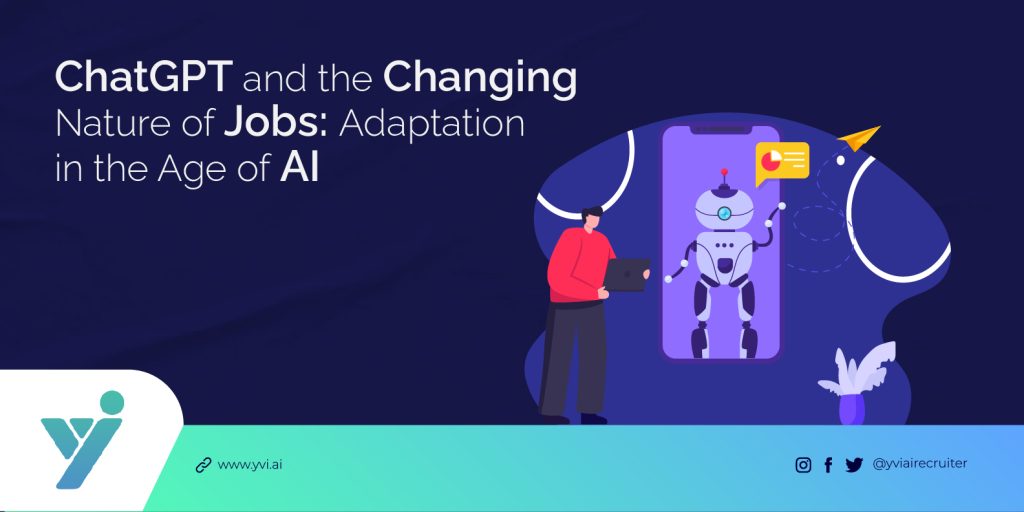The development of advanced artificial intelligence models like ChatGPT contributes to a profound transformation in the job market. While AI has the potential to increase productivity, streamline recruitment processes, and create new opportunities, it is also reshaping the nature of work in various ways. We will explore the impact of AI, like ChatGPT, on the changing landscape of jobs.
1. Augmentation, Not Replacement:
One common misconception is that AI models like ChatGPT are here to replace humans. Will ChatGPT replace jobs? GPT-4 will only partially supplant jobs. While it can automate specific programming tasks like generating code and documentation, more is needed to replace the human ingenuity and critical thinking essential for intricate software development. In reality, the current focus is on augmenting human capabilities. These AI systems can assist professionals in various domains, helping them make more informed decisions, automate repetitive tasks, and enhance productivity. ChatGPT can manage regular customer support enquiries, allowing human agents to concentrate on complicated issues and empathy-driven conversations.
2. New Skill Requirements:
As AI and automation take over routine and repetitive tasks, the demand for uniquely human skills is increasing. These include critical thinking, problem-solving, creativity, emotional intelligence, and adaptability. To be competitive in the ever-changing labour market, people must continuously improve their abilities and be lifelong learners.
3. The Rise of Hybrid Jobs:
AI is giving rise to a new category of “hybrid jobs”. These positions call for both technical proficiency and domain-specific knowledge. For example, a data scientist needs data analysis skills and an understanding of their industry. These roles are versatile and less susceptible to automation. Why hybrid work is the future? Hybrid work is considered the future because it fosters a highly engaged and productive workforce, enhancing company performance. Additionally, it contributes to higher employee retention by strengthening connections to colleagues and company culture, thereby promoting long-term commitment.
4. AI in Decision-Making:
AI models like ChatGPT are used in decision support across various sectors. Doctors use AI for diagnosing diseases, financial analysts rely on AI for investment advice, and managers use AI for strategic planning. The role of humans in these professions is evolving from making routine decisions to overseeing AI systems and creating complex, high-level judgments.
5. Ethical and Regulatory Roles:
The deployment of AI also requires oversight, ethics, and regulations. This has led to the emergence of roles focused on ensuring that AI systems are transparent, unbiased, and adhere to ethical standards. Ethical AI auditors, AI ethicists, and regulatory compliance experts are becoming increasingly important.
6. Reskilling and Upskilling:
Organizations and educational institutions focus on reskilling and upskilling programs to adapt to the changing job market. These initiatives aim to prepare the workforce for roles currently in demand and likely to remain in the future.
7. Gig Economy and Remote Work:
AI and digital technologies have enabled the gig economy to flourish. Freelancers and remote workers often use AI-driven platforms to find work and manage their careers. The boundary between traditional employment and independent contracting is becoming increasingly blurred.
8. Collaboration with AI:
The ability to work alongside AI systems is a valuable skill. Professionals need to understand how to interact with AI tools effectively. This includes configuring AI models, interpreting their outputs, and making decisions based on AI recommendations.
Conclusion
By automating repetitive processes and generating new job categories, introducing sophisticated AI models such as ChatGPT transforms the labour market. To prosper in this dynamic environment, people and institutions need to be proactive, flexible, and agile in seizing the chances that artificial intelligence presents. Rather than fearing AI, we should view it as a partner in reshaping the world of work. Our ability to collaborate effectively with AI, such as YVI, in the context of talent acquisition will define the future of jobs. Embracing platforms like YVI enhances our ability to identify and onboard top talent, making the collaboration between humans and AI a driving force in shaping the workforce of tomorrow.



